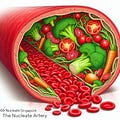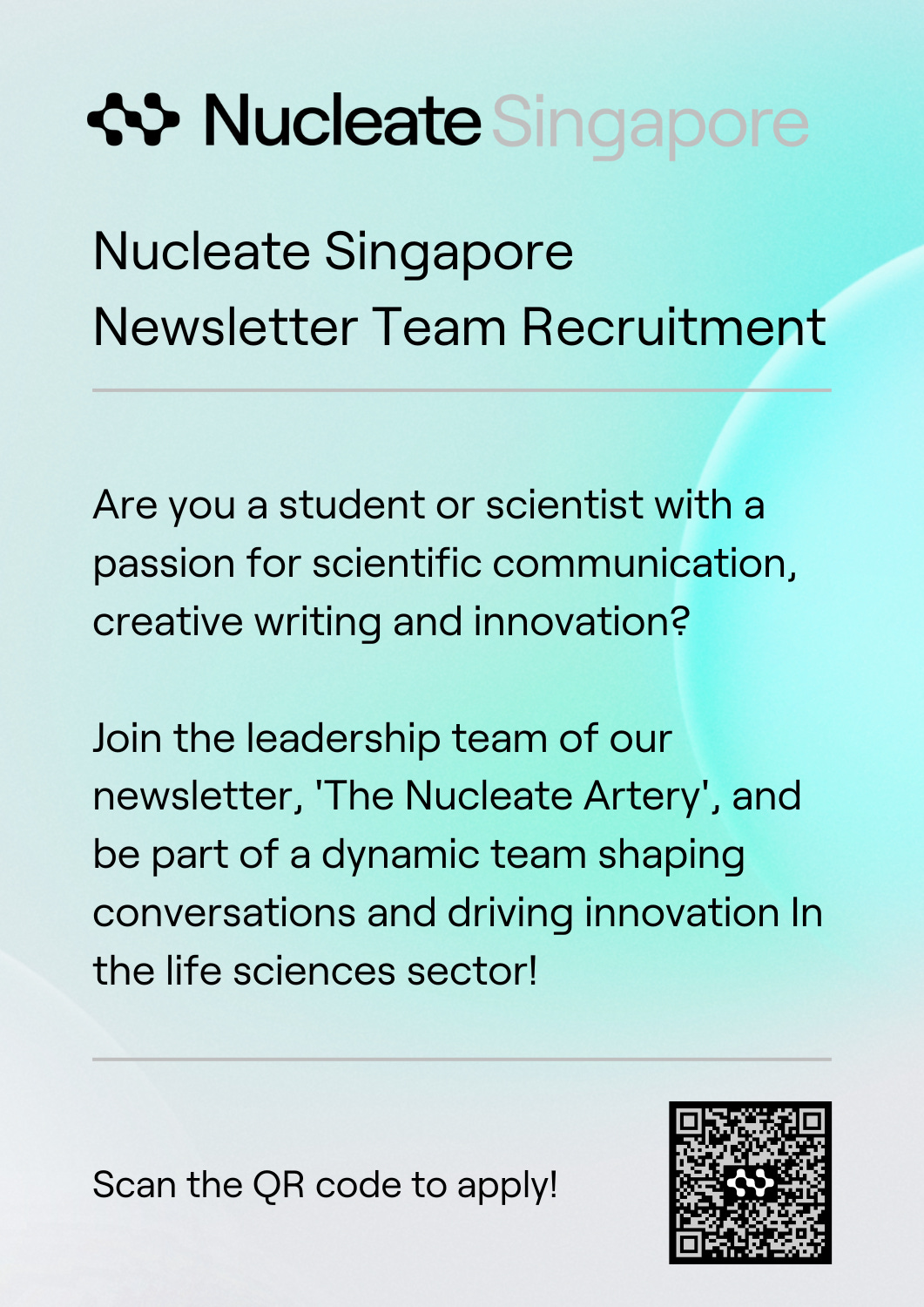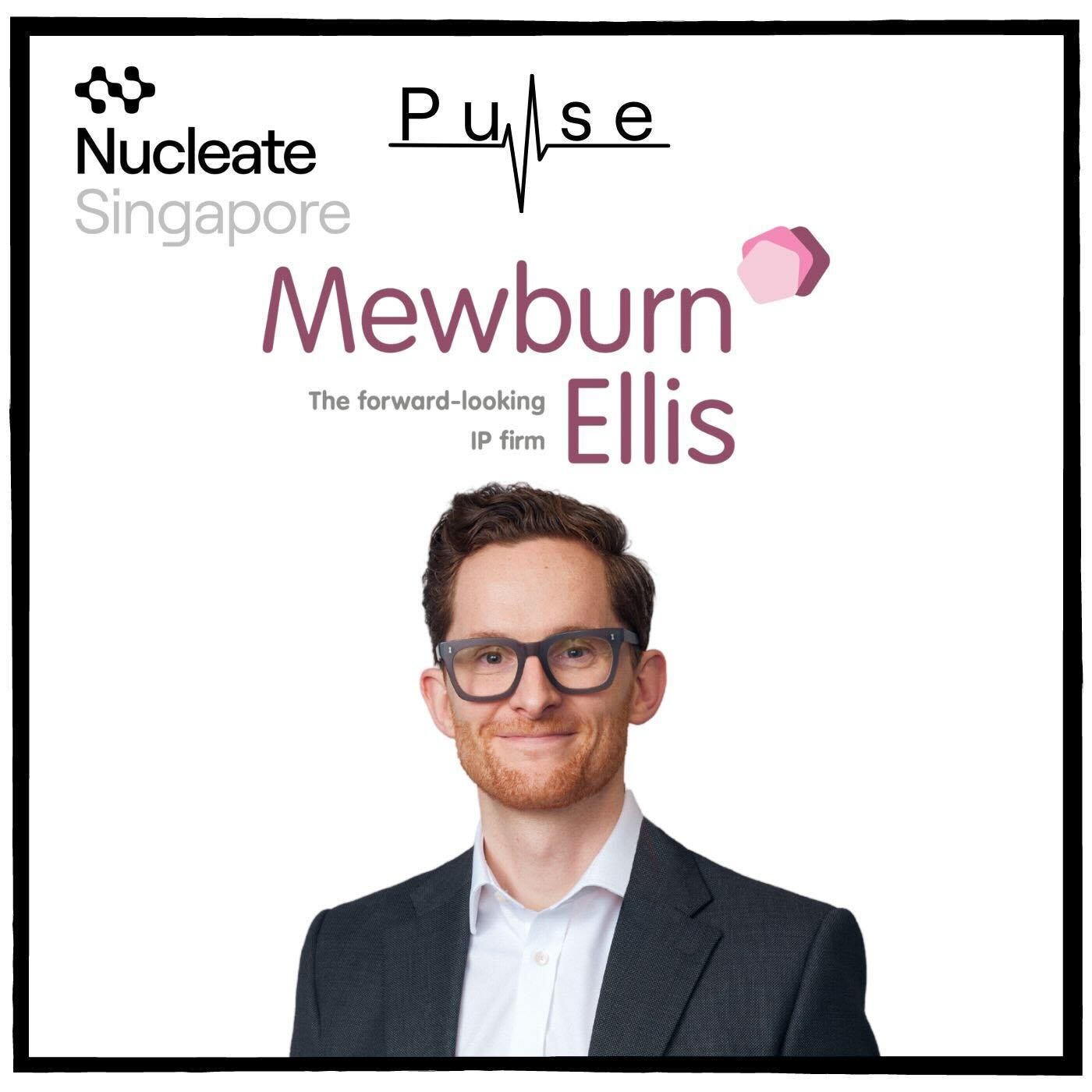The Nucleate Artery: WE ARE RECRUITING, better cancer vaccines, and cyborg organoids, all made locally!
We are The Nucleate Artery, a monthly newsletter focused on the latest biotech research and events in Singapore. Chat with us via our Slack community: @Liyana Ayub Ow Yong @Leong Kim Whye @Yeow Jiang @Ignacius Tay.
If you enjoyed reading this post, leave a comment and give us a like!
We're excited to announce that The Nucleate Artery is recruiting new writers!
As part of the team, you’ll have the exciting role of bringing cutting-edge local scientific research to our readers and reporting from the ground of the local biotech scene. We're looking for curious, dynamic, and passionate communicators ready to make an impact.
Join us to build your scientific communication portfolio and network within the life sciences ecosystem. Click here or scan the QR code below to apply now!
For now, let’s get into the rest of the article! Enjoy!
🍽️ Digestibles
(Research that has been published within the past 2 months)
CANCER IMMUNOTHERAPY: Deciphering cancer vaccine delivery
Cancer vaccines, similar to traditional vaccines, enhance the immune system's ability to recognize and destroy cancer cells by directing killer immune cells to target cancer-specific surface proteins. While these selective surface proteins themselves can potentially activate immune responses without posing safety risks, the use of artificial carriers for vaccine delivery often compromises the vaccine’s safety and effectiveness. Additionally, the complex designs of some carriers render them difficult to manufacture, presenting challenges in quality control and large-scale production. To overcome these problems, Xiang et al. devised a simple method to coordinate the assembly of cancer vaccine components using metal ions, which involves attaching a small, positively charged module to the therapeutic cancer peptide. The assembled nanovaccine effectively delivered its components to the lymphatic node and immune cells in mice without causing toxicity. When used together with an antibody that prevents cancer cells from escaping immune destruction, the combined effect suppressed or completely regressed tumours in about 50% of melanoma and colon cancer in mice. Given its straightforward assembly strategy, this approach holds significant promise for clinical applications, offering a promising advancement in the effective and safe delivery of cancer vaccines.
A resurgence in cancer vaccines?
At the American Association for Cancer Research (AACR) annual meeting in April this year, a session addressed the pivotal question: Are cancer vaccines ready for widespread use?
MIT Technology Review covers the latest development in cancer vaccines leveraging mRNA
Concurrent work on single-step self-assembly of peptide nanocapsules for drug delivery
BIOTECHNOLOGY: Building brain prosthetics using liquid-metal cyborg organoids
The treatment options for neurodegenerative disorders are limited in their effectiveness as they primarily focus on improving the quality of life of patients. As the disease progresses patients end up suffering from severe loss in downstream motor functions, highlighting the urgent need for more effective therapeutic strategies. However, ethical and technical constraints limit our investigation of the hippocampus, a critical region of the brain involved in memory and learning, necessitating the use of tissue models for its study. Moreover, we lack the devices to properly characterise its neural activities, which is fundamental to defining brain function. Wu et al. tackled both aspects in their work, improving on human hippocampal organoids induction and used lithographic techniques to create a tiny, detailed mesh that is stretchy and biocompatible. Layered on with liquid metals like gallium alloys for conductivity, the mesh could wrap around mini brain tissue and map the transmission of neural signals in real time and in 3D. This synergy between liquid metal interfaces and hippocampal organoids opens new avenues for non-invasive neurotherapeutic applications to revolutionise neuroprosthetics, and more importantly, unlock effective treatments for brain-related disorders.
Commercial entities also working on brain-computer interface technologies:
Blackrock Neurotech: This company focuses on implantable solutions for brain-computer interfaces. Blackrock Neurotech showcased its Neuralace next-generation neural interface, featuring a ultra-high channel count, flexible electrode for brain-computer interface (BCI) technology.
Neuralink: Co-founded by Elon Musk and a team of neuroscientists, Neuralink is at the forefront of developing implantable brain-machine interface systems.
On the pharmaceuticals front, FDA approves Eli Lilly’s drug for early-stage Alzheimer’s disease
🥡 Event Takeaways
(Exclusive insights from biotech events in SG)
We interview Max Tham from tHEMEat Company
We spoke with Max Tham, PhD, the former CEO, and current board member of a local food science startup, tHEMEat Company that was recently selected as a finalist for the Liveability Challenge 2024. This trailblazer blends scientific expertise with entrepreneurial spirit to revolutionise how we recreate and improve meat flavours and textures using alternative non-animal sources. In this interview, we go in depth and personal with Max to learn about the philosophies, unique challenges, and breakthroughs that defined his journey.
About tHEMEat Company: We are a food tech startup focusing on solutions for the alternative proteins of the future. Our Veme technology is a novel flavour catalyst that can boost meaty flavours in alternative protein products and replicate the look, cook, smell and taste of real meats.
This is a short teaser of the full interview that will be released on 28 June 2024. The full interview will feature these themes:
Transitioning from a PhD graduate to a CEO of a biotech startup (he started in his last year of his PhD!)
Support systems that a founder needs
The culture of risk-taking in Singapore vs the US
Mitigating risks in biotech as an employer
How do we encourage those who don’t have the technological readiness, but are still keen to enter this entrepreneurial space?
Encourage debate on ideas: Max envisions the creation of safe learning spaces that allow for the critical evaluation of ideas, through platforms that require no monetary obligations or fees. This safe space holds space for debate sessions where constructive criticisms can be shared and more often than not it culminates in self-reflection and improvement; he believes everyone in the room will benefit from this, which is why it would be worth emulating in scientific spaces.
Extend seed idea incubation: The technological maturation process cannot be rushed; one cannot accelerate the technologies that one does not have. Instead, taking the time to evaluate these ideas and providing constructive feedback would have more value, together with letting technology maturation take its natural course.
Ask the experts: It would greatly help to get advice from a panel of experts across various technical and commercial fields - almost like a startup clinic. Hearing from them will allow one to understand if venture creation is a good fit. The ones that stay harbour the resilience and fortitude to stomach this arduous journey.
…one cannot rush the technological maturation process. You can't accelerate the technologies that you don't have.
How do we develop a keen eye for commercialisability?
Develop breadth of knowledge: To evaluate whether a product is commercialisable, it requires a broad understanding of how world economics is powered. Whether it be startup history or analysis of the current climate, geopolitics - having that wide breadth of knowledge of how society is built will help.
Get to know your customers: Alongside product development, consumer appeal has a huge role to play. It also helps to understand the underlying psychology of how people approach and interact with certain products. For example, within the alternative protein space, there was a lot of hype regarding cell-based meat, but it in itself bears a slew of problems in attracting a critical consumer base. There's still a long way to go in terms of certain scientific breakthroughs, affordability and consumer acceptance. You have to understand the sentiments of the consumers and the market, and you can only do this by walking the ground.
🎧 Nucleate Singapore Pulse
Protecting innovations in biotech with Mewburn Ellis’ Dr. Adam Gregory
Dr. Adam Gregory is a patent attorney and Partner at Mewburn Ellis with a specialisation in life sciences technologies. In this episode, he highlights success stories from Singapore’s vibrant biotech scene, including Enleofen Bio and Hummingbird Bioscience, and discusses the evolving nature of patent strategies in the face of emerging technologies like AI and gene editing. From understanding the differences between patents, trademarks, and copyrights to exploring the patent application process and common pitfalls, this episode is packed with valuable information for anyone in the biotech industry.
📆 Events happening this month
Conference
LogiPharma Summit in Asia | LogiPharma Asia
(19-20 June, in person at Singapore 098269)
Strategies for Successful Technology Translations | SNBC & SINERGY
(4 July, 3:30 PM - 6:00 PM, in person at Singapore 139955)
Singapore Cell and Gene Therapy Pan Asia Summit 2024 | ACTRIS
(18-20 July, in person at Singapore 169856)
SCRI Clinical Trials Symposium 2024 | SCRI
(30-31 July, in person at Singapore 169856)
Fireside chat/Panel discussion
Decoding Startup Deal Potential: Driving Towards a Blockbuster | JLABS Singapore
(20 June, 3:30 PM - 6:00 PM, in person at Singapore 179023 )
Improving Patient Outcomes with Remote Monitoring and AI | SGInnovate and Teijin
(26 June, 4:00 PM - 6:00 PM, in person at Singapore 059911 )
Paths Beyond Practice: The Road Less Travelled | NUS Medicine Digital Accelerator
(28 June, 6:00 PM - 8:00 PM, in person at Singapore 049481 )
Passion and Innovation: Thriving in Nonlinear Career Trajectories | SGInnovate
(10 July, 4:00 PM - 6:00 PM, in person at Singapore 059911 )
Opportunity
Pitch and Demo Night | BetterSG
(22 July, 7:00 PM - 9:30 PM, in person at Singapore 059911 & online)
Falling Walls Lab Singapore | SGInnovate & Falling Walls Lab
(Deadline 31 July)







